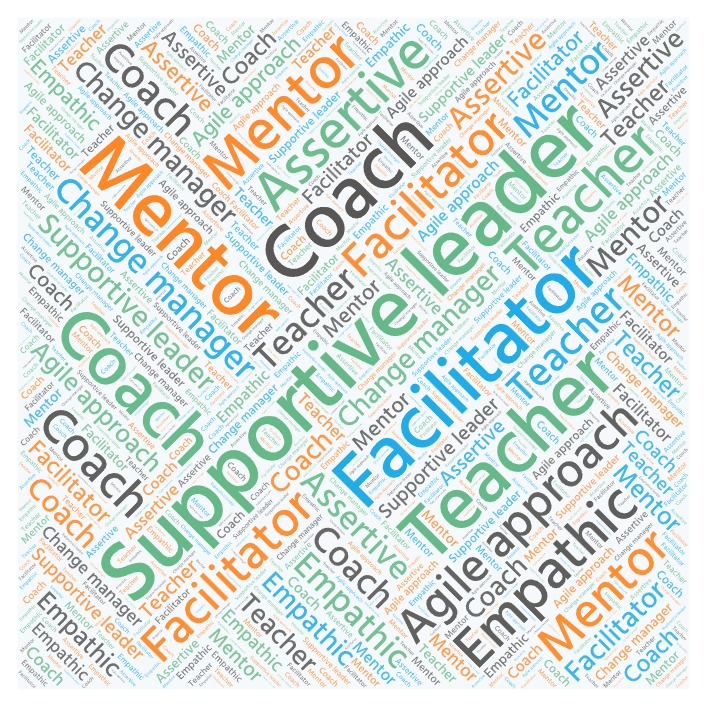Scrum master interview questions for IT recruiters. We have compiled the most pertinent questions! Check out our blog post!
More...
This blog article was created mostly for scrum masters and IT recruiters. For scrum masters, I think it is always worthwhile to go through technical issues that may pop up during a job interview, and for IT recruiters, to guarantee that job interview preparation is swift and efficient.
If you are unfamiliar with scrum master roles and responsibilities, I recommend reading our blog post about it first. If you know nothing about scrum, check out our post about the scrum framework.
This blog post's goal is to give a collection of scrum master interview questions that could help you to gain a stronger understanding of scrum-related issues.
For IT recruiters it's important to note, that you should ask these questions only if you're confident in your ability to understand both the questions and the candidate's answers. If you don't have enough expertise about the issue to have a meaningful conversation, don't you these questions at all, or use them but only with care. It's best to avoid attempting to show more knowledge than you have.
I wish you success with your interview! Let's take a closer look at the subjects and scrum master interview questions!
Daily Standup Meetings
- 1What is the purpose of daily stand-up meetings in Scrum, and why are they essential for the team's success?
- 2How do you ensure that every team member contributes effectively during the daily stand-up meetings?
- 3How do you deal with team members who consistently fail to attend or participate in the daily stand-up meetings?
- 4How do you keep the daily stand-up meetings short and focused while ensuring that all necessary information is communicated?
- 5How do you encourage the team to discuss potential issues and blockers during the daily stand-up meetings?
- 6What techniques do you use to track progress and identify potential roadblocks during the daily stand-up meetings?
- 7How do you ensure that the daily stand-up meetings remain relevant and useful as the project progresses?
- 8What strategies do you employ to make sure that the daily stand-up meetings don't turn into status update meetings?
- 9How do you encourage team members to communicate openly and honestly during the daily stand-up meetings?
- 10How do you tailor the daily stand-up meetings to meet the specific needs of the project and the team?
Sprint Planning
- 1What is the purpose of Sprint planning and why is it important in Scrum?
- 2How do you ensure that all team members are engaged and participate in Sprint planning?
- 3What is the ideal duration of Sprint planning and how do you manage time effectively during the planning session?
- 4How do you prioritize the Product Backlog items during Sprint planning and what criteria do you use to do so?
- 5How do you determine the capacity of the team for the upcoming Sprint during Sprint planning?
- 6How do you ensure that the Sprint goal is clearly defined and understood by the entire team during Sprint planning?
- 7How do you handle changes in requirements or priorities during Sprint planning?
- 8What are the key elements of a well-crafted Sprint backlog and how do you create it during Sprint planning?
- 9How do you facilitate the communication and collaboration among the team members during Sprint planning?
- 10How do you measure the success of Sprint planning and what metrics do you use to evaluate it?
Fun Fact
The term "Scrum Master" is inspired by the rugby term "scrum," where players huddle together to restart the game. In the agile development world, Scrum Masters help their teams huddle and work efficiently on projects.
Demos
- 1Can you explain what a demo is in the context of Scrum?
- 2How often should demos be held during a Sprint?
- 3What are some common challenges that teams face when conducting demos?
- 4What is the role of the Scrum Master during a demo?
- 5Can you walk me through the process of preparing for a demo?
- 6How do you measure the success of a demo?
- 7What is the purpose of having stakeholders attend a demo?
- 8How do you handle feedback and questions during a demo?
- 9Can you share a specific example of how a demo helped the team improve the product?
- 10How do you ensure that demos remain focused on the goal of showcasing completed work?
Retrospective
- 1What is the primary objective of the retrospective?
- 2Can you describe a typical retrospective meeting in a Scrum project?
- 3How do you ensure that all team members actively participate in the retrospective?
- 4What are some of the common challenges you have faced during a retrospective?
- 5How do you handle disagreements or conflicts that may arise during the retrospective?
- 6How do you measure the effectiveness of a retrospective meeting?
- 7Can you share an example of a retrospective action item that had a significant impact on the project's performance?
- 8How frequently should retrospectives be conducted in a project?
- 9What are some best practices you follow to ensure that the retrospective remains constructive and focused?
- 10How do you ensure that the retrospective's outcomes are communicated and implemented effectively within the team?
Scrum Master: Not A Project Manager
Despite the common misconception, a Scrum Master is not a project manager. They are more focused on guiding and coaching the team, ensuring that they follow agile principles and Scrum framework, rather than managing day-to-day tasks.
Backlog
- 1Can you explain what a product backlog is and its purpose in Scrum?
- 2How do you prioritize items in the backlog? What factors do you consider when prioritizing?
- 3How do you manage changes to the backlog during a sprint?
- 4Can you describe the difference between a product backlog item and a user story?
- 5How do you ensure that the backlog items are appropriately detailed and refined before they are included in a sprint?
- 6Can you give an example of how you have dealt with a situation where the backlog became too large to manage effectively?
- 7How do you involve stakeholders in the backlog refinement process?
- 8Can you discuss how you handle conflicts or disagreements among stakeholders regarding the backlog?
- 9Can you explain how you ensure that the backlog reflects the customer or user needs and feedback?
- 10How do you measure the success of your backlog management process?

Let's go on with additional scrum master interview questions!
Helping The Team
- 1How do you ensure that team members are effectively collaborating and communicating with one another?
- 2How do you identify and address conflicts within the team?
- 3What methods do you use to promote trust and transparency among team members?
- 4How do you coach team members who may be struggling or falling behind in their work?
- 5How do you encourage team members to take ownership and accountability for their tasks and responsibilities?
- 6What strategies do you use to help the team stay focused and aligned with project goals and priorities?
- 7How do you foster a culture of continuous improvement within the team?
- 8How do you measure and track team performance and progress towards goals?
- 9How do you facilitate effective feedback and discussion during retrospectives?
- 10How do you support team members in their personal and professional growth and development?
Servant Leadership
Scrum Masters embody the concept of servant leadership, prioritizing the needs of their team members and supporting them in achieving their goals, rather than asserting authority and control.
Supporting The Team
- 1How do you support your team when they encounter obstacles or challenges during a sprint?
- 2What steps do you take to ensure that team members feel supported and empowered to achieve their goals?
- 3Can you describe a time when you had to deal with a team member who was struggling to meet their targets, and how you supported them to improve their performance?
- 4How do you encourage collaboration and communication within the team, especially when dealing with conflicting opinions or viewpoints?
- 5Can you give an example of a situation where you had to balance the needs of the team with the expectations of stakeholders or management?
- 6How do you ensure that team members have the resources and tools they need to do their jobs effectively?
- 7How do you provide feedback and coaching to team members to help them develop their skills and abilities?
- 8What strategies do you use to foster a positive team culture and morale?
- 9How do you support team members who may be struggling with work-life balance or other personal challenges?
- 10How do you measure the success of your efforts in supporting the team, and what metrics do you use to evaluate your effectiveness?
Monitoring The Team
- 1How do you ensure that the team is meeting its objectives and goals?
- 2What metrics do you use to measure the team's progress?
- 3How do you identify and address any issues that might arise within the team?
- 4What techniques do you use to monitor team performance?
- 5How do you keep track of each team member's progress?
- 6How do you ensure that team members are working effectively and efficiently?
- 7How do you motivate team members to perform at their best?
- 8How do you handle conflicts or disagreements within the team?
- 9How do you communicate the team's progress to stakeholders?
- 10How do you adjust team performance based on feedback from stakeholders and team members?
Monitoring Potential Risks and Obstacles
- 1How do you identify potential risks and obstacles during the project?
- 2How do you prioritize identified risks and obstacles?
- 3Can you describe a time when you had to address a potential risk or obstacle during a project?
- 4How do you communicate potential risks and obstacles to the project team?
- 5Can you describe a time when you had to mitigate a risk or obstacle during a project?
- 6How do you ensure that risks and obstacles are being continuously monitored throughout the project?
- 7Can you provide an example of a project where risk management played a crucial role in the success of the project?
- 8How do you involve the project team in risk identification and mitigation?
- 9How do you balance the need for risk mitigation with the need to deliver the project on time?
- 10How do you measure the effectiveness of your risk management processes?
Continuous Improvement
Scrum Masters are champions of continuous improvement, helping their team identify areas for growth and supporting them in implementing positive changes for better performance and product quality.
Protecting The Team
- 1What do you understand by the term "protecting the team" in Scrum?
- 2How do you ensure that the team is protected from external distractions and interruptions during the Sprint?
- 3How do you handle conflicts within the team and protect team members from negative effects?
- 4How do you ensure that the team has a safe and comfortable environment to work in?
- 5How do you protect the team from unrealistic expectations or pressures from stakeholders or management?
- 6Can you give an example of how you have protected the team in the past from an external threat or influence?
- 7How do you encourage open communication within the team while still maintaining a level of protection?
- 8How do you deal with team members who are not performing as expected while still protecting their dignity and respect?
- 9How do you balance the need for transparency with the need for protection?
- 10How do you ensure that the team's well-being is prioritized over the delivery of a product or project?
Encouraging Team Members
- 1What strategies have you used in the past to encourage team members who are struggling or feeling demotivated?
- 2How do you ensure that team members have a clear understanding of their roles and responsibilities within the team?
- 3How do you handle conflicts between team members, and what steps do you take to encourage them to work collaboratively?
- 4What techniques do you use to promote open and transparent communication within the team?
- 5How do you encourage team members to take ownership of their work and to be accountable for their results?
- 6What steps do you take to foster a culture of continuous learning and improvement within the team?
- 7How do you handle situations where team members are resistant to change or new ideas?
- 8What methods have you found to be effective in recognizing and rewarding team members for their contributions?
- 9How do you encourage team members to collaborate and share their knowledge and expertise with each other?
- 10What steps do you take to build trust and respect between team members and to create a positive team dynamic?
Scrum Framework
- 1Can you explain the Scrum framework in your own words?
- 2How does Scrum differ from other Agile methodologies?
- 3What are the three roles in Scrum, and what are their responsibilities?
- 4Can you walk me through the Scrum events and their purposes?
- 5How does Scrum help with team collaboration and communication?
- 6What is the importance of the Sprint Review and Sprint Retrospective meetings?
- 7How do you ensure that the team is following Scrum values and principles?
- 8Can you give an example of how you have handled a situation where the team is struggling to meet a sprint goal?
- 9What is the importance of having a product backlog, and how do you prioritize items within it?
- 10How do you incorporate feedback from stakeholders into the Scrum framework?
I hope you found the scrum master interview questions above useful!
If you need Senior Scrum Master, don't hesitate. Contact us, we can find the proper IT experts for your projects. Get to know more on our IT Contracting page!



